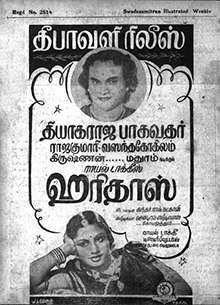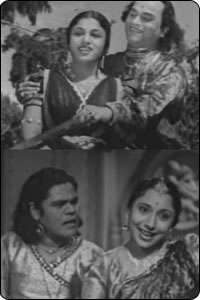Haridas (1944 film)
Haridas is a 1944 Tamil language film directed by Sundar Rao Nadkarni and starring M. K. Thyagaraja Bhagavathar, T. R. Rajakumari and N. C. Vasanthakokilam. It holds the record of being the first film to run continuously for 110 weeks at a single theatre.[1][2][3][4][5][6] IBN Live included Haridas in its list of 100 greatest Indian films of all time.[7] This film had a colour sequence which was manually colored by studio technicians. The film was entirely recoloured and released in year 1946.[8] The poster in this page mentions that in has released with a full colour copy (below the title). The movie was produced by Madurai Royal Talkies and Central Studios in Coimbatore.
| Haridas | |
|---|---|
 Theatrical release poster | |
| Directed by | Sundar Rao Nadkarni |
| Produced by | Royal Talkies |
| Written by | Ilangovan |
| Starring | M. K. Thyagaraja Bhagavathar T. R. Rajakumari N. C. Vasanthakokilam N. S. Krishnan T. A. Madhuram Pandari Bai S. R. Krishna Iyengar |
| Music by | Papanasam Sivan G. Ramanathan |
| Cinematography | Adi Irani T. Muthuswamy |
| Edited by | Sundar Rao Nadkarni |
Release date | 16 October 1944 |
Running time | 117 minutes |
| Country | India |
| Language | Tamil |
| Box office | ₹40 lakh (US$56,000) |
Plot
Haridas (Thyagaraja Bhagavathar) is a vain individual who spends his life in luxury and lust, ignored his parents for wife (Vasanthakokilam), ignoring his wife for a courtesan (T. R. Rajakumari). But when his wealth is appropriated by the courtesan, he realizes life's realities, reforms and spends the rest of his days serving his parents and God.
Cast
Cast according to the song book:
|
|
Production
Haridas was directed by Sundar Rao Nadkarni, a Marathi film director, and produced by Royal Talkies. The film was adapted from the book Sri Krishna Vijayam by Elangovan.[1] It was based on the story of the life of a poet-saint called Haridas.[1][6] The role of Haridas was played by M. K. Thyagaraja Bhagavathar, who was the highest-paid actor in the Tamil film industry at the time.[9] It was very short (10,994 Feet[10]) compared to other films from the same period.[11] Featuring a number of melodious songs sung by Bhagavathar, the film was released on Diwali (16 October) 1944.[12] Classical musician N. C. Vasanthakokilam, who was often compared to M. S. Subbulakshmi as a singer, played the role of Haridas' wife.[12][11] The film also marked the debut of renowned Tamil actress Pandari Bai.[11][13] The comedic duo of N. S. Krishnan and T. A. Mathuram were cast in this film.[2] Th film was shot at Central Studios, Coimbatore.[14][15]

Soundtrack
All songs in this film became hits. The song "Manmadha Leelayai Vendrar Undo" celebrating erotic love has become an enduring hit and the phrase has entered every day Tamil usage. Papanasam Sivan was the composer and G. Ramanathan was in charge of the orchestration. A partial list of songs from Haridas:
Two songs, sung by N. C. Vasanthakokilam ('Enadhu Manam Thulli Vilaiyaaduthe' and 'Kannaa Vaa') were recorded by HMV distinct from the film version of these songs and were released with black label. (See External links for link)
All lyrics are written by Papanasam Sivan.
Reception
Haridas hit the theatres on Deepavali (16 October) 1944. It was a huge success and ran for 110 consecutive weeks till Deepavali (22 November) 1946 at the Sun Theatres in Broadway, Madras.[11][6] Across theatres it had an uninterrupted theatrical run of 133 weeks.[3] With the profits earned from the film, the producers established a knitting company in Madurai.[6] Bhagavathar became the Tamil cinema industry's highest paid star and was offered a salary of ₹1 lakh per film.[11][6] Following the success of Haridas, Bhagavathar was immediately booked for as many as twelve films.[6] However, he was not able to enjoy his success as he was arrested in November 1944 as a suspect in the Lakshmikanthan Murder Case.[11][2] IBN Live included the film in its list of 100 greatest Indian films of all time.[7]
See also
Lakshmikanthan Murder Case
References
- Dhananjayan 2014, p. 56.
- Blast From the Past – Haridas 1944, The Hindu 11 July 2008
- Thoraval 2011, p. 38.
- Baskaran 1996, p. 46.
- Anandan 2004, p. 33.2.
- "Filmography of M. K. Thyagaraja Bhagavathar Page 1". Archived from the original on 4 July 2008. Retrieved 17 May 2008.
- "100 Years of Indian Cinema: The 100 greatest Indian films of all time". IBN Live. Retrieved 6 May 2013.
- http://indpaedia.com/ind/index.php/Colour_films_in_Tamil#The_1940s:_Hand-tinted_films
- Rajadhyaksha, Ashish; Willemen, Paul (1994). Encyclopaedia of Indian cinema. British Film Institute. p. 57. ISBN 0-85170-455-7. ISBN 978-0-85170-455-5.
- Anandan 2004, p. 28.35.
- Dhananjayan 2014, p. 57.
- Randor Guy. "From Silents to Sivaji Ganesan – A Lookback". Archived from the original on 23 May 2008. Retrieved 17 May 2008.
- Guy, Randor (14 February 2003). "Actress who glowed with inner beauty". The Hindu. Retrieved 17 May 2008.
- https://www.thehindu.com/features/cinema/coimbatores-celluloid-connection/article6044541.ece
- https://www.thehindu.com/features/cinema/celluloid-stories/article5810184.ece
External links
| Wikimedia Commons has media related to Haridas (1944 film). |
- Haridas on IMDb
- "Video of the 'Manmathan Leelayil Vendrar Undo' song from Haridas". (In public domain in India)
- "Video of 'Krishna Mukunda Murare' song from Haridas". (In public domain in India)
- "Video of 'Annaiyum Thanthaiyum Thaane' song from Haridas". (In public domain in India)
- "Video of 'Ennudal Thanil' song from Haridas". (In public domain in India)
- Kannaa Vaa on YouTube - Sung by N. C. Vasanthakokilam
- Enadhu Manam Thulli Vilaiyaduthe on YouTube - Sung by N. C. Vasanthakokilum
Bibliography
- Thoraval, Yves (2000). The cinemas of India. India: Macmillan. p. 38. ISBN 0-333-93410-5. ISBN 978-0-333-93410-4.
- Baskaran, S. Theodore (1996). The eye of the serpent: an introduction to Tamil cinema. Chennai: East West Books. p. 46.
- Limca book of records. Bisleri Beverages Ltd. 1996.
- Anandan, Film News (2004). Sadhanaigal padaitha Tamil Thiraipada Varalaaru (in Tamil). Chennai: Sivagami Publications. pp. 28.35, 33:2.CS1 maint: ref=harv (link)
- Dhananjayan, G. (2014). Pride of Tamil Cinema: 1931 to 2013. Blue Ocean Publishers.
- Rajadhyaksha, Ashish; Willemen, Paul (1994). Encyclopaedia of Indian cinema. British Film Institute. p. 57. ISBN 0-85170-455-7. ISBN 978-0-85170-455-5.